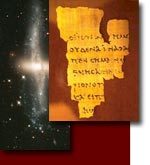| Site Map | Contacts | Links | Newsletter | |
Genesis 1:24-31 DAY 6
Food
Hebrew Text
hlkal b?u qry-lk - Every green plant for food
Every plant and tree is given to man for food. Note there are only two kinds of vegetation mentioned here. The animals are just given plants to eat, and not fruit from trees. There seems to be an ancient tradition that man and animals were herbivorous.
Sumerian Texts
There is an interesting text that tells about man before he learned how to make clothes, and learned how to harvest gain. The text Ewe and Wheat says:
And there was no cloth to wear
The people of those distant days,
They knew not bread to eat;
They knew not cloth to wear;
They went about with naked limbs in the Land,
And like sheep they ate grass with their mouth,
Drinking water from the ditches (Clifford 1994, 45).
This sounds like the description of cave men before civilization developed. In another text How Grain Came to Sumer it begins, "At that time, humans ate only grass like sheep; It was then, of old, that An made cereals, barley, and flax descended from heaven" (Clifford 1994, 47). Clifford comments that there are two stages of early human development in mythologies; first culture appears, and then instruments of culture. Before this man lived like the animals (Ibid., 46).
Akkadian Texts
In the ANE man was created by the gods in order to supply the gods with food. In Atra-Hasis the gods were tried of doing all the work so they decided to create man so he could do the work for them and supply the gods with food (Lambert & Millard 1969, 57-67; lines 191, 339). Later man became so noisy the gods sent a great flood. Atra-Hasis (Noah) is commanded to build a boat to save his life and animals. It rained for seven days and seven nights. Atra-Hasis was saved.
In the Gilgamesh Epic Enkidu is described as a primitive man as follows:
Aruru washed her hands,
Pinched off clay and cast it on the steppe.
[On the step]pe she created valiant Enkidu,
Offspring of ..., essence of Ninurta.
[Sha]ggy with hair is his whole body,
He is endowed with head hair like a woman.
The locks of his hair sprout like Nisaba.
He knows neither people nor land;
Garbed is he like Sumuqan.
With the gazelles he feeds on grass,
With the wild beasts he jostles at the watering-place,
With the teeming creatures his heart delights in water.
Clifford states, "Enkidu leaves his animal-like existence when he enters the city and accepts kingship in the person of King Gilgamesh; he becomes fully human.
Egyptian Literature
In the Hymn to Amon Re it says, "He who made herbage (for) the cattle, And the fruit tree for mankind" (ANET, 366; COS, 39). In the Hymn to Aten it says, "All beasts browse on their herbs" (COs, 45; ANET, 370).
Next - The Post-Creation Sabbath
Bibliography
